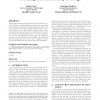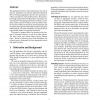55 search results - page 4 / 11 » Why Use a Unified Knowledge Representation |
CCS
2009
ACM
14 years 8 months ago
2009
ACM
Unified and formal knowledge models of the information security domain are fundamental requirements for supporting and enhancing existing risk management approaches. This paper de...
SEMWEB
2010
Springer
13 years 2 months ago
2010
Springer
Space and time have not received much attention on the Semantic Web so far. While their importance has been recognized recently, existing work reduces them to simple latitude-longi...
SEMCO
2009
IEEE
14 years 2 months ago
2009
IEEE
Software development and maintenance are highly distributed processes that involve a multitude of supporting tools and resources. Knowledge relevant to these resources is typicall...
SIGIR
1996
ACM
13 years 11 months ago
1996
ACM
The aggregated structure of documents plays a key role in full-text, multimedia, and network Information Retrieval (IR). Considering aggregation provides new querying facilities a...
IFIP
1992
Springer
13 years 11 months ago
1992
Springer
Retrieving relevant information in Data and Knowledge Bases containing a large number of di erent types of information is a non trivial problem. That is the reason why, in areas l...


